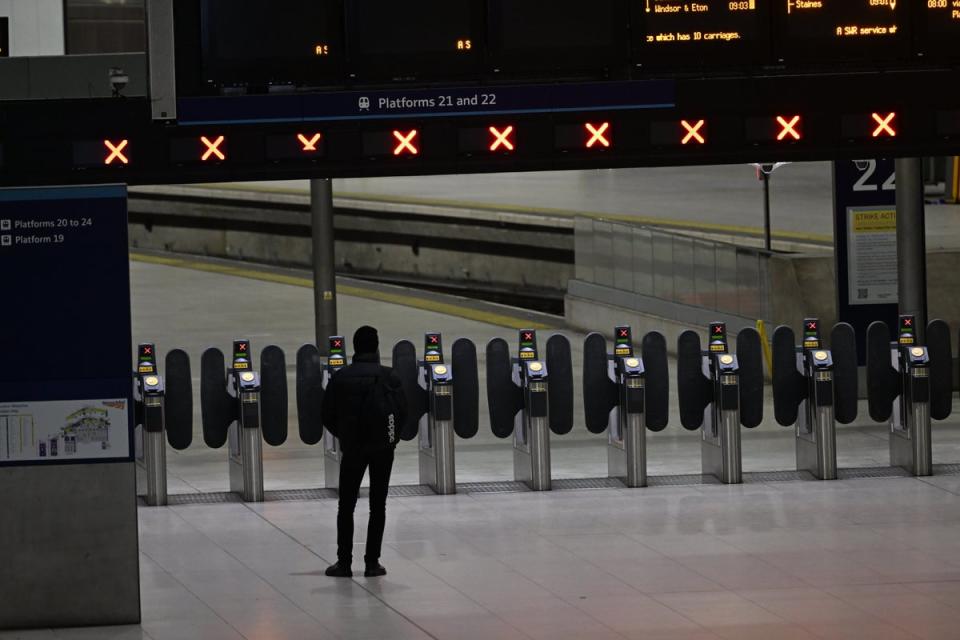Train drivers’ union says ‘zero’ hope of resolving rail strike soon - but Network Rail says 7/10 chance

The chances of resolving the rail dispute are currently “zero”, the leader of the train drivers union has told MPs.
Mick Whelan, general secretary of Aslef, said his union and the 14 train firms were as far apart as they have ever been on reaching an agreement on a pay rise.
His view was endorsed by the TSSA union but the RMT, which represents train crew, station staff and signallers, backed away from a similarly pessimistic assessment of the state of its negotiations, which also include Network Rail.
In contrast, Network Rail chief negotiator Tim Shoveller said there was a “seven” out of 10 chance that it could reach agreement with the RMT.
The Commons transport committee was on Wednesday morning questioning the union leaders, Network Rail and the Rail Delivery Group, which represents train firms, over the rail dispute, which brought the railways to a near standstill over Christmas and in the first week of 2023.
No new strike dates have been set but the unions have warned action could continue indefinitely if agreement is not reached over pay and working conditions.
The cost of the strikes, in terms of fares revenue lost to the Government, was put at “£300m to £500m” by Steve Montgomery, chair of the Rail Delivery Group.
He also told the hearing that 990 ticket offices were at risk of closure under longer-term cost-cutting plans.
Transport committee chairman Iain Stewart asked the union chiefs to rate the chance of a resolution on a scale between one and 10, “where on one you remain on different planets and 10 I can go out and buy a hat for the wedding”.
Mr Whelan replied: “I think you can include zero in your one to 10 and we are further away than when we started.”
Frank Ward, interim general secretary of the TSSA, said: “I wouldn’t disagree with that.”
But Mr Lynch said: “I wouldn’t be able to say. It depends on discussions. I’m not going to use a scale but we haven’t got an agreement, and until we get an agreement we are not close to it.”
Mr Whelan said an offer from the Rail Delivery Group last Friday had “smashed” an “enabling agreement” in place between the train firms and Aslef and had jeopardised the prospect of further negotiations being successful.
Talks betwen the RMT, TSSA and the Rail Delivery Group are due to resume on Thursday. The RMT met Network Rail negotiators on Tuesday. Aslef is due to respond to the Rail Delivery Group next week.
Mr Lynch said the parties were “a long way” off on pay – saying Network Rail had offered nine per cent over two years and the rail firms eight per cent, at a time comparative inflation was 14 per cent.
But Mr Montgomery, of the Rail Delivery Group, said it was “within reasonable areas” of being able to reach a deal with the RMT, with a similar hope for negotiations with the TSSA.
He admitted that “more work” was needed with Aslef and “try and get back round the table”.
He warned that the railways - which have yet to return to pre-pandemic demand on weekdays - were at risk of losing passengers. “We are seeing customer confidence in this industry ebbing away.”
Mr Shoveller rated the chances of reaching agreement with the RMT as “seven” out of 10. Network Rail has already reached agreement with TSSA and Unite members.
He said 36 per cent of RMT members had already voted in favour of accepting the pay offer. “I think there is every chance, by some carefully targeted discussions, of achieving that,” he said.
Mr Ward said TSSA members had been able to accept a pay offer from Network Rail as it guaranteed lower paid workers an additional £1,750 but so similar offer had been made from train firms.
Mr Whelan said he only discovered late last Friday that he had been emailed details of an offer from the Rail Delivery Group offer at 3.18pm – 20 minutes before he said it was sent to the media.
He told the committee: “There is not one line in that deal, from the opening comments to the final full stop, that I could recommend.”
Asked how long the unions could sustain the dispute financially, Mr Whelan said: “I have said repeatedly we are in this for the long haul.
“I would like to resolve it tomorrow, quite honestly… [but] we can financially sustain this for an awful long time – and our members.”
Mr Ward said: “I would turn the question on its head and ask how long do you think the Department for Transport can afford to financially sustain the losses that the train operating companies in particular have been incurring as a consequence of this?”
The dispute also involves Government demands to modernise the railways.
The RMT is also opposed to the “elimination” of ticket offices - up to 990 were revealed to be at risk - and the removal of guards from trains, which Aslef also opposes - though many services currently run without guards.
Mr Lynch said: “We will not accept driver-only operation [of trains] on any company without a fight. It will never happen while I’m the general secretary. It will never happen while the RMT exists.”
Mr Whelan said train drivers “hate” driver-only operation as they believe it to be “unsafe” – especially if there are no staff at train stations.
Mr Lynch said the dispute was the “bequest” from former Transport Secretary Grant Shapps, now Business Secretary, who he suspected was “still involved” behind the scenes preventing an agreement being reached.

 Yahoo Finance
Yahoo Finance 